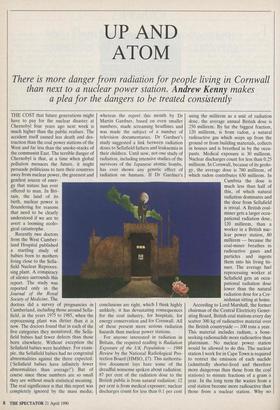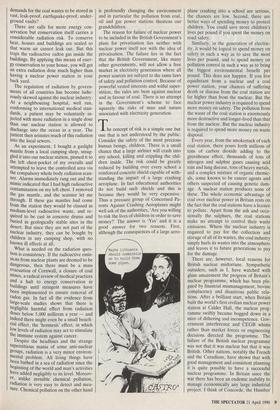UP AND ATOM
There is more danger from radiation for people living in Cornwall
than next to a nuclear power station. Andrew Kenny makes
a plea for the dangers to be treated consistently
THE COST that future generations might have to pay for the nuclear disaster at Chernobyl four years ago next week is much higher than the public realises. The accident itself caused less death and des- truction than the coal power stations of the West and far less than the smoke-stacks of the communist East. The terrible danger of Chernobyl is that, at a time when global pollution menaces the future, it might persuade politicians to turn their countries away from nuclear power, the greenest and gentlest source of ener- gy that nature has ever offered to man. In Bri- tain, the land of its birth, nuclear power is floundering for reasons that need to be clearly understood if we are to avert a looming ecolo- gical catastrophe.
Recently two doctors from the West Cumber- land Hospital published a startling study of babies born to mothers living close to the Sella- field Nuclear Reproces- sing plant. A conspiracy of silence surrounds this report. The study was reported only in the Journal of the Royal Society of Medicine. The doctors did a survey of pregnancies in Cumberland, including those around Sella- field, in the years 1975 to 1985, when the reprocessing plant was dirtier than it is now. The doctors found that in each of the five categories they monitored, the Sella- field babies had fewer defects than those born elsewhere. Without exception the Sellafield babies were healthier. For exam- ple, the Sellafield babies had no congenital abnormalities against the three expected. ('Sellafield babies have infinitely fewer abnormalities than average!') But of course since these numbers are so small they are without much statistical meaning. The real significance is that this report was completely ignored by the mass media; whereas the report this month by Dr Martin Gardner, based on even smaller numbers, made screaming headlines and was made the subject of a number of television documentaries. Dr Gardner's study suggested a link between radiation doses to Sellafield fathers and leukaemia in their children. Until now, not one study of radiation, including intensive studies of the survivors of the Japanese atomic bombs, has ever shown any genetic effect of radiation on humans. If Dr Gardner's conclusions are right, which I think highly unlikely, it has devastating consequences for the coal industry, for hospitals, for energy conservation and for Cornwall. All of these present more serious radiation hazards than nuclear power stations.
For anyone interested in radiation in Britain, the required reading is Radiation Exposure of the UK Population — 1988 Review by the National Radiological Pro- tection Board (HMSO, £7). This authorita- tive document lays bare some of the dreadful nonsense spoken about radiation: 87 per cent of the radiation dose to the British public is from natural radiation; 12 per cent is from medical exposure; nuclear discharges count for less than 0.1 per cent According to Lord Marshall, the former chairman of the Central Electricity Gener- ating Board, British coal stations every day scatter 300 kg of radioactive material over the British countryside — 100 tons a year. This material includes radium, a bone- seeking radionuclide more radioactive than plutonium. No nuclear power station would be allowed to do this. The nuclear station I work for in Cape Town is required to restrict the emission of each nuclide (admittedly shorter-lived and therefore more dangerous than those from the coal stations) to minute fractions of a gram a year. In the long term the wastes from a coal station become more radioactive than those from a nuclear station. Why no demands for the coal wastes to be stored in vast, leak-proof, earthquake-proof, under- ground vaults?
There are calls for more energy con- servation but conservation itself carries a considerable radiation risk. To conserve heat, houses and buildings are sealed so that warm air cannot leak out. But this traps the radioactive radon gas inside the buildings. By applying this means of ener- gy conservation to your house, you will get an extra radiation dose much higher than having a nuclear power station in your back yard.
The regulation of radiation by govern- ments of all countries has become ludic- rously skewed against the nuclear industry. At a neighbouring hospital, well run, conforming to international medical stan- dards, a patient may be voluntarily in- jected with more radiation in a single dose than our nuclear station is allowed to discharge into the ocean in a year. The patient then urinates much of this radiation Into the local sewers.
As an experiment, I bought a gaslight mantle from a local camping shop, smug- gled it into our nuclear station, pinned it to the left chest-pocket of my overalls and attempted to leave the controlled area via the compulsory whole body radiation scan- ner. Alarms immediately rang out and the mimic indicated that I had high radioactive contamination on my left chest. I removed the gas mantle, and the scanner let me through. If these gas mantles had come from the station they would be classed as medium-level radioactive waste, and re- quired to be cast in concrete drums and buried in geologically stable sites in the desert. But since they are not part of the nuclear industry, they can be bought by children in any camping shop, with no known ill effects at all.
What is needed on the radiation ques- tion is consistency. If the radioactive emis- siGns from nuclear plants are deemed to be dangerous, then there must be a mass evacuation of Cornwall, a closure of coal mines, a radical review of medical practices and a halt to energy conservation in buildings until stringent measures have been implemented to ensure removal of radon gas. In fact all the evidence from large-scale studies shows that there is negligible harmful effect from radiation doses below 5,000 millirem a year — and indeed there might even be a small benefi- cial effect, the `hormesis' effect, in which low levels of radiation may act to stimulate the immune system against cancer. Despite the headlines and the strange superstitious mania of some anti-nuclear groups, radiation is a very minor environ- mental problem. All living things have been bathed in a sea of radiation since the beginning of the world and man's activities have added negligibly to its level. Moreov- er,unlike invisible chemical pollution, radiation is very easy to detect and mea- sure. Chemical pollution on the other hand is profoundly changing the environment and in particular the pollution from coal, oil and gas power stations theatens our grandchildren.
The reason for failure of nuclear power to be included in the British Government's plans for privatisation lies neither with nuclear power itself nor with the idea of privatisation. The failure lies in the fact that the British Government, like many other governments, will not allow a free market in electricity generation where all power sources are subject to the same laws of safety and pollution control. Because of powerful vested interests and wilful super- stition, the rules are bent against nuclear and in favour of coal. There is no attempt in the Government's scheme to face squarely the risks of man and nature associated with electricity generation.
The concept of risk is a simple one but one that is not understood by the public. Consider the safety of the most precious human beings, children. There is a small chance that a large airliner will crash into any school, killing and crippling the chil- dren inside. The risk could be greatly reduced by building over every school a reinforced concrete shield capable of with- standing the impact of a large crashing aeroplane. In fact educational authorities do not build such shields and this is because they would be very expensive. Thus a pressure group of Concerned Pa- rents Against Crashing Aeroplanes might well ask of the authorities, 'Are you willing to risk the lives of children in order to save money?' The answer is 'Yes' and it is a good answer for two reasons. First, although the consequences of a large aero- plane crashing into a school are serious, the chances are low. Second, there are better ways of spending money to protect children. You could save more children's lives per pound if you spent the money on road safety.
Similarly, in the generation of electric- ity, it would be logical to spend money on safety in such a way as to save the most lives per pound, and to spend money on pollution control in such a way as to bring the biggest environmental benefit per pound. This does not happen. If you live equidistant from a nuclear and a coal power station, your chances of suffering death or disease from the coal station are far higher than from the nuclear. But the nuclear power industry is required to spend more money on safety. The pollution from the waste of the coal station is enormously more destructive and longer-lived than that from the nuclear. But the nuclear industry is required to spend more money on waste disposal.
Every year, from the smokestack of each coal station, there pours forth millions of tons of carbon dioxide adding to the greenhouse effect, thousands of tons of nitrogen and sulphur gases causing acid rain and lung disease, tons of heavy metals, and a complex mixture of organic chemic- als, some known to be cancer agents and others suspected of causing genetic dam- age. A nuclear station produces none of these. The whole economic advantage of coal over nuclear power in Britain rests on the fact that the coal stations have a licence to pollute. Apart from the ash and occa- sionally the sulphurs, the coal stations make no attempt to control their waste emissions. Where the nuclear industry is required to pay for the collection and storage of all of its wastes, the coal industry simply hurls its wastes into the atmosphere and leaves it to future generations to pay for the damage.
There are, however, local reasons for British nuclear misfortune. Sympathetic outsiders, such as I, have watched with glum amazement the progress of Britain's nuclear programme, which has been pla- gued by financial mismanagement, bovine complacency and disastrous public rela- tions. After a brilliant start, when Britain built the world's first civilian nuclear power station at Calder Hall, the nuclear prog- ramme swiftly became bogged down in a mire of dithering and incompetence. Gov- ernment interference and CEGB whims rather than market forces or engineering decisions directed the programme. The failure of the British nuclear programme was not that it was nuclear but that it was British. Other nations, notably the French and the Canadians, have shown that with good management and consistent planning it is quite possible to have a successful nuclear programme. In Britain since the war there has been an endemic inability to manage economically any large industrial project. I think of Concorde, the Humber Bridge, the Thames Barrier, the Channel Tunnel. . . .
Meanwhile, as politicians prevaricate and environmentalists bluster, the fragile balance of the natural order is tilting towards calamity. The world's weather is beginning to change in a dramatic and ominous way. This may be because of the greenhouse effect, caused mainly by the emission of carbon dioxide. To continue to pour multitudes of noxious gases into the air from the smokestacks of coal stations is to play dice with the future of our planet. We need more electricity, since electricity itself is an entirely non-polluting energy, but we need rational rules for generating it. The free market unfettered fails to control pollution since it is cheaper for a power station to pollute than not to. There must be government control against pollution. But total state control of industry produces catastrophic pollution, as Eastern Europe demonstrates. The only answer seems to be to allow the free market to operate, subject only to consistent regulation on safety and pollution control.
To be fair to Mrs Thatcher and her energy ministers over the years, no country has yet found the courage to allow free market electricity. In the United States, the power utilities are hampered by eccen- tric regulation and their tariffs fixed by state Public Utility Commissions. A free market would, I believe, end the trend towards ever bigger power stations and encourage the construction of smaller ones, more able to respond to changing technologies. They could be built and commissioned more quickly. The nuclear industry seems on the brink of a gentle revolution towards smaller, simpler reac- tors with `passive' safety, that is, where safety lies with the laws of nature rather than the mechanisms of man. Rolls-Royce has designed such a reactor, and the present fiasco of privatisation might yet turn out to be a blessing for the nuclear industry if in the future it turns to these simpler designs.
There are risks in all methods of electric- ity generation. An explosion at a solar power station in California in November last year caused the evacuation of 400 workers. Very dangerous chemicals are used to manufacture the photovoltaic panels that produce electricity directly from sunlight. Gas power stations produce carbon dioxide and nitrogen compounds. The dams for hydro-electricity carry the dramatic risk of accidents, such as the one at Vaiont in Italy in 1963 which killed 3,000 people, and the more insidious ecological threat of salination. We need free competi- tion to select and develop the safest, cleanest, cheapest means of generation. Such competition would deliver us from the prejudices of the politicians and the growing environmental threat of the `Green' parties. In such competition, coal power, unless radical new technologies are developed, would disappear and gas would be relegated to its best use, domestic heating. Solar, hydro and wind power would have a part to play. But nuclear power, based on the most powerful force in the universe, thus needing to use the smallest amount of fuel per unit of electric- ity, thus causing the smallest disturbance, has advantages rooted deeply in nature and would be the most likely to prevail.
`Edgar! You're missing the best part!'




















































 Previous page
Previous page